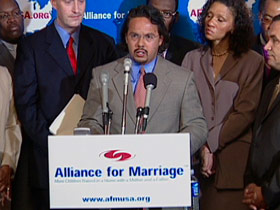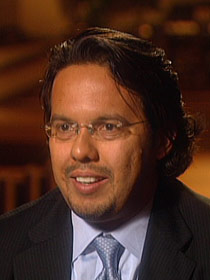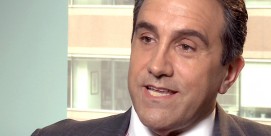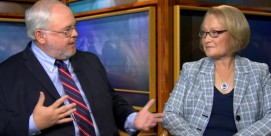In This Episode << SLIDE LEFT TO SEE ADDITIONAL SEGMENTS
Sammy Rodriguez Extended Interview
Q: To what extent has the immigration issue mobilized Latinos to get involved in the political process in a way they haven’t before?
A: I do believe it has been the tipping point for the Hispanic American community. You know, there have been little blips in the radar screen historically on different issues, but the immigration issue, the 500,000 marching in Los Angeles, the marches across the country — we’ve never seen a Hispanic American community mobilized as much as we’ve seen via the immigration issue, so there are some — it was a negative situation that has a positive outcome, which is, some would say, the awakening of the giant. Others are waiting for it to have some definitive outcomes and result in the ballot box in respect to voting percentage turnout. It’s already beginning to show some definitive threads that are irreversible. You have more constituencies built; you have relationships built between Hispanic civic organizations, faith organizations with social organizations, so I do believe it’s the beginning of a brand new Hispanic American chapter.
Q: Has it also awakened politicians to the potential power of the Hispanic community?
A: I think they are looking more at the potential power and clout of the Hispanic community. Some would argue that right now, currently, in lieu of the immigration debate, that the recent marches and the mobilization even of the Hispanic church hasn’t resulted in outcomes in the voting box. So politicians are saying right now we’re not seeing an incredible amount of Hispanics registering to vote. However, I think it takes time. You know, as Latinos, we are infamous for arriving fifteen, twenty minutes late, but then we do arrive. We eventually do arrive. It’s going to happen. This — the immigration debate has provoked an awakening, where Hispanics will turn out to vote, definitely more than ever before. It may not happen in the 2006 election, but by 2008 you’re going to have that 12 to 14 percent shift over to 18, 19, 20 percent [voting rates], and that’s where the politicians are waking up. That’s where the great angst occurs right now, where you see Republicans and Democrats divided on this issue. Republicans understand that Hispanics resonate with a lot of their conservative social values. They are voting more and more Republican every day — until the immigration issue came up. Democrats know that in order to cater to Hispanics they need to lean a little bit more to socially conservative, at least moderate, sides of issues. So both parties understand the power of the Hispanic voting bloc, and in the upcoming elections they are going to even understand it a bit more. In turn, the largest minority group in America, 42-43 million Hispanics, become the deal-breakers of national elections.
Q: Politicians from both sides of the aisle are calling you.
A: We have both, correct. We have both from the Democratic Party and the Republican Party. They understand that there is a constituency out there that needs to be engaged. They understand that these individuals, Hispanic voters throughout America, particularly in national elections have the power to determine who leads our nation. Therefore, they contact the fast growing demographic, the Hispanic evangelical church, via the National Hispanic Christian Leadership Conference. It’s been an interesting season, you know. We are nonpartisan, and we truly are. I think we side on both sides of the aisle on different issues. But it does bring up the question of to what extent does the Hispanic church want to get involved in the political process other than telling their members you have a civic responsibility to participate in the electoral process? That’s where we’re debating right now, you know. Up to what degree do we get engaged? Is it every issue that comes out there in the forefront? And I think we’re measuring that with a biblical worldview. Issues that deal with social justice, with poverty, oppression, with those who are disenfranchised and can’t speak for themselves, issues of life for us and marriage are still very important. So, yes, both parties are engaging the Hispanic evangelical church, and they are going to continue to engage the Hispanic evangelical church a lot more than they have historically.
Q: You were part of an anti-gay marriage rally at the Capitol.

A: I participated in a pro-traditional marriage rally, and that’s not a matter of semantics. But it wasn’t anti-gay or anti-anything. I came representing the Hispanic evangelical church. We need mommy and daddy in the home for the simple reason our young kids — there’s gang activity in the Hispanic community. The Latino high school dropout rate is a travesty; it’s an epidemic in our community. It’s probably, you know, right next to immigration, the issue we need to address the most. Teenage pregnancy in our community: What is the greatest agent or the greatest factor in the home that could act as just the antidote to these social ills? Mom and Dad in the home. So when I participate in those rallies, it’s about we need Mom and Dad as the model at home rather than having any other sort of type of model, because sociologically these are the best results and best outcomes.
Q: Many in the Hispanic evangelical church care about this issue. Between issues of gay marriage and abortion on one side and immigration on the other, which is going to have the most influence with Latinos go to the voting booth?
A: Great question. At the end of the day — and maybe this is the answer that some of my colleagues wouldn’t want me to expose — gay marriage and abortion. Immigration is right up there. However, they are looking at life, they’re looking at the continuity and respect to an institution that has been around since the beginning. You know, if they had to pick one or the other it’s probably going to be life and marriage over immigration. Not that immigration is not important. It’s going to be a tough call. It’s going to be a tough call. But for Hispanic evangelicals, there are still some issues that are way up on there on the agenda, and I think right now with the immigration issue, immigration is shifting to be an issue right in line with marriage, traditional marriage, and sanctity of life. It may not be one or two, but somewhere in a close third is the immigration issue, or better yet, what we would see it as [is] defending those who can’t defend themselves.
Q: Let’s talk about some of the specific challenges for each party, starting with the Republicans. Surveys indicate that more than half of all Hispanic evangelicals voted for George Bush in the last election. This is a very fast-growing segment of the Latino vote, and they have been increasingly Republican. How big a challenge is the immigration issue for Republicans?
A: The honeymoon period is over. There was a honeymoon season between Hispanic evangelicals, Hispanic Protestants, conservatives, and the Republican Party. The Republican Party resonated, spoke the language. George W. Bush, I believe, is personally responsible for engaging more Hispanics to vote Republican. We saw that in the 2004 elections — 44 percent. That’s just — it’s there, it’s a fact, and he did that. He did that with his every once and awhile articulating or trying to express, in his limited Spanish proficiency, his appreciation for the Hispanic-American narrative, that special thread. So he’s been successful in doing that. His compassionate conservatism resonated in the Hispanic community. Hispanics would all be Democrats if it would be the Democratic Party of John F. Kennedy and prior to LBJ — anything prior to the late 1960s, early 1970s, prior to McGovern, you would have Hispanics doing the same thing as Afro-Americans — 90 percent Democratic. For the Republicans, that honeymoon season is over because of immigration. Here’s the question Hispanics have right now: Is the Republican Party the party of Pat Buchanan, Tom Tancredo, James Sensenbrenner, or is the Republican Party the party of George W. Bush, John McCain, and Lindsay Graham? That’s what Hispanic evangelicals are asking right now. What is the Republican Party? What does it stand for? Is it Tancredo or Bush? Is it compassionate conservatism, or is it a xenophobic sort of anti-immigrant, anti-Latino party? That’s a question that has to be answered. In lieu of that question not being answered, you’re going to have Hispanics reserve their voting privileges until they have clarity. I don’t necessarily see Hispanics jumping the bandwagon and overwhelmingly voting Democratic. I do see them holding back and not participating in the voting, in the electoral process, and not going to the ballot box, waiting: All right, let’s find out really who speaks on behalf of Republicans in America. And so on the Republican side, you know, that’s where I believe we’re at.
Q: Did Hispanics, and particularly Hispanic evangelicals, listen to the debate on immigration and hear from the Republicans a lot they didn’t like?
A: Absolutely, and we hear that from our constituency throughout the 50 states. I can’t deny the fact that the majority of Hispanic evangelicals have a more conservative inclination. They lean voting towards the Republican Party in lieu of the conservative agenda or traditionalist agenda. The recent debates have become so anti-Hispanic; they’ve been so polarizing. The issue of, for example, of English proficiency, English as the official language in America. That sort of exercise, you know, let’s reaffirm the fact in a non-binding process that English is the official language in America. Well, we know it is! It’s de facto. We need it to be. But that’s conveying a message particularly to who? What’s the largest minority out there? Who’s in the midst of the debate? I mean, you know, the Hispanic community is not naïve to the fact that that’s an anti-Spanish-speaking resolution that came out. They’re hearing that. And who’s hearing that? It’s not just the Hispanics who lean and vote more toward liberal causes, which is a de minemis few, and I mean a de minemis few. Hispanic liberals — that may be an oxymoron. Hispanics have a conservative ethos of their narrative that even if they are Democrats, they still have probably pro-life, pro-family, etc., etc. Who’s hearing this the loudest is the Hispanic conservative voter, and they are saying hold on a moment, this is coming from a Republican-led Congress. There’s a Republican-led Congress right now that seems to be conveying a message of “We’re not welcoming you.”
Q: And what about the Democrats? What is their big challenge?

A: The Democratic Party has an incredible opportunity to engage, to stop the leakage right now in the Hispanic populace and say, Hey, 44 percent Bush? Let’s go back. Here we are. We’re not the Democratic Party of extreme ideologues on either side of the issue. We’re a moderate party. Matter of fact, we look more like you, and let me present what that means. We value your faith. We’re not in any way, form, or shape trepidatious about your exercising your faith. Matter of fact, we believe faith is important in the dialogue. Be Christians, love God, worship God, go get’em, we support you. We believe it’s part of our American heritage. We love your commitment to family, and in lieu of that, here are our day care programs and health care initiatives, etc., etc. We connected the Democratic threads to the conservative values of Hispanics. Now I don’t necessarily see that happening immediately, but the Democrats have an opportunity right now of engaging Hispanic voters, particularly this growing trend of conservative voters, by saying not only do we hold hand with you and your [values] of God, family and country, but we also have a commitment like you do for the poor, social justices issues, addressing global issues like Darfur and AIDS and crises around the world, and we would like to build more viable relationships with Latin America. We don’t appreciate the Hugo Chavezes of the world. We would like to turn that around, and not by building a ten foot wall, but rather by building bridges to the Latin American communities, protecting our borders, stopping all illegal immigration but building viable relationships with Latin America, relationships that we have neglected for the past 10, 15 years. So that’s, I think — the Democratic Party has an opportunity of engaging many Hispanic voters. To do so, they would have to move a lot more towards the middle than what their national agenda is somehow perceived to present.
Q: How big a challenge is the issue of abortion for Democrats?
A: It’s very important, and again, all the books out there by Democrat pundits, you know, reverberate with that. In order to engage this minority community, we need to switch to somewhere practical on the abortion issue. I am wholeheartedly to sanctity of life, and so is our organization as part of our bylaws and our platform. Perception versus reality: The Democratic Party stands for partial birth abortion. That’s the perception out there in the Hispanic-American community. The Dems support partial birth abortion. It would be hard to find Latinos in America that support partial birth abortion. They find that to be anathema, an abomination. How dare you support that? And it’s issues like partial birth abortion that more and more drive Hispanics toward the Republican voting bloc. The Dems would have to really say, you know what? Here’s some things. We’re beginning to hear some things coming out of Democratic leaders: “Abortion should be legal but rare. We should do whatever it takes to minimize the number of abortions.” Some Democrats are coming out with abortion should be legal in the first trimester; afterwards it should be illegal. Some compromise. Not that we could compromise on the issue of life, but at least a lot more realistic than let’s go full gamut, including partial birth abortion, whatever it takes there’s no life-worth until, you know — it goes against the very ethos of the Hispanic-American narrative. So Democrats would have to move, shift a lot more towards the right on the abortion issue and on the marriage issue.
Q: Talk about the moderating influence the Hispanic community would have on both parties.
A: I think the Hispanic-American community is going to move the Republican Party more towards a compassionate conservative presentation. It’s going to embody what George W. Bush attempted to articulate. It really does embody the compassionate conservative side. Hispanic Americans would resonate more with the Reaganesque, the Ronald Reagan sort of blue collar Democrats and with Bush’s compassionate conservatives than the extreme fringe Republican traditional base. Moderation. Democrats: Hispanics, if they’re successful, if we are successful, we’re going to push the Democratic Party back to the days prior to McGovern, back to the days of the party of John F. Kennedy, and we’re going to push the Republican Party to really thread in a definitive manner the philosophy of George W. Bush and more the philosophy of Ronald Reagan. So we’re going to push both more towards the middle. Republicans: Fiscally conservative? Absolutely. Tough on defense? Absolutely. Social values? Absolutely. But, dear Republicans, what about social justice? What about the issues of poverty? We need to deal with Social Security reform, and we have to tackle the health care problem, particularly in the Hispanic community, where the majority of Hispanics have no health care coverage in America, and I’m not talking about illegals now. Just the majority of Hispanics have no health care coverage. So how do we deal with that? So there has to be a reasonable shift on social justice issues. The Democratic side: They need to turn more towards the middle in respect to social values issues, those values that — abortion, marriage — not necessarily to acquiesce absolutely, but a more moderate presentation.
Q: What are some of the dangers Hispanic Christians need to be wary of as they start getting more politically active?
A: My personal greatest concern would be to see Hispanic voters become the token, guaranteed, solidified voting bloc of one party. I believe in our party system, our multi-, our two-party system. Some would argue we need a multi-party system. I believe in the system we currently have. I believe it’s not productive for any ethnic group or any constituency to be blocked in to one particular party. At that moment, we become, you know, just tools in someone’s tool chest, and we are engaged and manipulated as one deems appropriate, and then for the rest of the season, you know, you’re not necessarily an important factor. We become a tool of political expediency rather than an engaged constituency for the better of our country. That’s my greatest concern, and I say this with a great amount of respect for African-American political leadership throughout America. But I believe one of the issues in the African-American community is that there is a almost a de facto voting constituency, over 90 percent, towards one party from the African-American community. However, I think it works against the African-American community to have 90 percent voting towards one party. I think there needs to be a sense of balance and openness to consider, knowing that the majority of African-American Christians resonate with the social values most expressed by another party. So that’s my fear regarding the Hispanic community, that we become part and parcel, one voting bloc of one particular party. I think debate is healthy, and I think participating in both parties will enable us to transform both parties for the best and the better of our country.
Q: Have you been working with Hispanic Catholics on some of these issues?
A: The answer is yes and, matter of fact, one of the great outcomes of the immigration debate has been the forging of relationships between Hispanic evangelicals and the Hispanic Catholic Church. Historically there was a wall. However, this immigration debate has brought about wonderful opportunities to build relationships, so yes, we are beginning to work with Hispanic Catholic leadership, and we are working on social justice issues, on issues of poverty, on issues of addressing the Latino high school dropout rate, on issues of even registering to vote, on political civic engagement and addressing some global issues, you know, AIDS crisis, AIDS in the Latino community and AIDS around the world, particularly in Africa. How can the Catholic Church and the evangelical church support not only transmitting the gospel, but transmitting services that are out there to Africans on behalf of the Hispanic community? I think it’s a brand new season between Hispanic Catholics and Hispanic evangelicals.
This is a season where we are having a national debate. The debate is not even about immigration; it really isn’t. That’s more of a red herring. It’s more of a cover-up for a very necessary debate in America. It’s a debate regarding these 43 million Hispanics. It’s a debate about the latinization of America. How Latino will we become in America? It’s a debate about Ricky Martin and Taco Bell. It’s a debate about the language. It’s a debate about how America looks and feels. Forty-three million strong, and the birth rate, of course, in Hispanic Americans, let’s just say — Hispanic families are pretty productive, fertile. We’re having a debate, covering it up with immigration. At the end of the day, I would look at America collectively and say Hispanic Americans — there’s no reason at all whatsoever to fear, to be trepidatious, to have any angst with regard to this incredible populace, and even the immigrant Hispanic community — God-fearing, family-loving, hard-working individuals. I think Hispanics are going to bring about, believe it or not, this is not some sort of messianic complex, but I do think Hispanic Americans are going to be exercising what the Bible would state as the ministry of reconciliation. We have our nation polarized between Republicans and Democrats, conservatives and liberals. It’s, you know, immigrant and anti-immigrant. It’s polarized right here, right down down to the middle. What if Hispanic Americans are here at this time — and I would use some terms that we use in the evangelical world — prophetically, to function as a bridge between both sides? That’s what I think our role is in America in the twenty-first century, to reconcile, to bring together, to offer a moderate, middle answer and bring these two hands together. Where we reflect both sides of the issues and both sides of the party and both ideologies, we’re there, right in the middle, more than any other community, so I think we’re going to bring about, or we’re going to attempt to exercise, a ministry of reconciliation and bring this nation together. And truly this will be the irony: Let the headlines read in 2075, “Latino immigrants solidify the notion of one nation under God.” And that will be our narrative.







